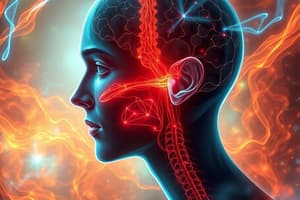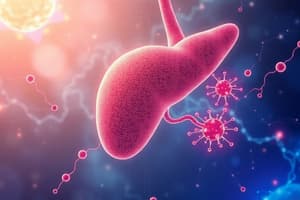Podcast
Questions and Answers
What is the primary function of insulin in the body?
What is the primary function of insulin in the body?
- Promotes catabolism of fats
- Increases blood sugar levels
- Activates thyroid hormones
- Stimulates glucose uptake (correct)
Which condition is characterized by insufficient production of adrenal hormones?
Which condition is characterized by insufficient production of adrenal hormones?
- Hyperthyroidism
- Cushing's Syndrome
- Addison's Disease (correct)
- Diabetes Mellitus
Which gland is known as the 'master gland' of the endocrine system?
Which gland is known as the 'master gland' of the endocrine system?
- Thyroid Gland
- Pancreas
- Adrenal Glands
- Pituitary Gland (correct)
What process is promoted by glucagon in the body?
What process is promoted by glucagon in the body?
What mechanism typically helps maintain hormonal balance by reducing output when a threshold is reached?
What mechanism typically helps maintain hormonal balance by reducing output when a threshold is reached?
Hyperthyroidism is primarily associated with which of the following symptoms?
Hyperthyroidism is primarily associated with which of the following symptoms?
Which hormone produced by the adrenal glands is involved in the stress response?
Which hormone produced by the adrenal glands is involved in the stress response?
What is the main effect of an underactive thyroid gland?
What is the main effect of an underactive thyroid gland?
Flashcards are hidden until you start studying
Study Notes
Hormone Regulation
- Definition: Process by which hormone levels are controlled within the body.
- Key Processes:
- Synthesis: Hormones are produced by endocrine glands.
- Secretion: Hormones are released into the bloodstream.
- Transport: Hormones circulate through the blood to target organs.
- Activation/Inactivation: Hormones are activated by specific enzymes or inactivated by liver metabolism.
Endocrine Disorders
- Diabetes Mellitus: Insulin deficiency leads to high blood sugar levels.
- Hypothyroidism: Underactive thyroid results in low hormone levels causing fatigue, weight gain, etc.
- Hyperthyroidism: Overactive thyroid leads to excess hormone production, causing weight loss, anxiety, etc.
- Cushing's Syndrome: Excess cortisol production leading to symptoms like obesity and high blood pressure.
- Addison's Disease: Insufficient production of adrenal hormones causing weakness, low blood pressure, and skin changes.
Metabolic Processes
- Anabolism: Building up of complex molecules (e.g., protein synthesis).
- Catabolism: Breaking down of complex molecules into simpler ones (e.g., cellular respiration).
- Role of hormones:
- Insulin promotes anabolism (glucose uptake, fat storage).
- Glucagon promotes catabolism (glycogen breakdown).
- Thyroid hormones regulate basal metabolic rate.
Gland Functions
- Pituitary Gland: Master gland controlling other endocrine glands; produces growth hormone, ACTH, TSH, etc.
- Thyroid Gland: Regulates metabolism through thyroxine (T4) and triiodothyronine (T3).
- Adrenal Glands: Produce cortisol (stress response), aldosterone (blood pressure), and adrenaline (fight-or-flight response).
- Pancreas: Controls blood sugar levels through insulin and glucagon production.
- Gonads: Ovaries/testes produce sex hormones (estrogens, testosterone) affecting reproduction and secondary sexual characteristics.
Feedback Mechanisms
- Negative Feedback: Common regulatory mechanism; reduces output of a process when a certain level is reached (e.g., high blood sugar stimulates insulin release, which lowers blood sugar).
- Positive Feedback: Increases output until a specific event occurs (e.g., oxytocin release during childbirth enhances contractions).
- Importance: Ensures hormonal balance and homeostasis; prevents overproduction or underproduction of hormones.
Hormone Regulation
- Definition: The body's intricate system that maintains optimal levels of hormones.
- Key Processes:
- Synthesis: Endocrine glands, specialized tissues, manufacture hormones.
- Secretion: These glands release hormones into the bloodstream for transport.
- Transport: Hormones travel through the blood, reaching target organs and tissues.
- Activation/Inactivation: Hormones undergo specific activation or inactivation through enzymatic processes or liver metabolism.
Endocrine Disorders
- Diabetes Mellitus: Occurs when the pancreas doesn't produce enough insulin, or the body can't effectively use the insulin it produces, leading to high blood sugar levels.
- Hypothyroidism: An underactive thyroid gland results in insufficient hormone production, causing symptoms including fatigue, weight gain, and slowed metabolism.
- Hyperthyroidism: An overactive thyroid gland produces excessive hormones, leading to symptoms like weight loss, anxiety, and increased heart rate.
- Cushing's Syndrome: High levels of cortisol caused by prolonged exposure to the hormone, often due to adrenal gland dysfunction.
- Addison's Disease: A rare disorder where adrenal glands don't produce enough cortisol and aldosterone, leading to weakness, fatigue, and low blood pressure.
Metabolic Processes
- Anabolism: The building up of complex molecules from simpler ones, like protein synthesis.
- Catabolism: The breakdown of complex molecules into simpler ones, like cellular respiration.
- Role of hormones:
- Insulin: Promotes anabolism, facilitating glucose uptake by cells and storing energy as fat.
- Glucagon: Promotes catabolism, breaking down glycogen stores to increase blood sugar.
- Thyroid hormones: Regulate basal metabolic rate, influencing overall energy expenditure.
Gland Functions
- Pituitary Gland: The "master gland," controlling other endocrine glands by producing hormones like growth hormone (GH), adrenocorticotropic hormone (ACTH), and thyroid-stimulating hormone (TSH).
- Thyroid Gland: Responsible for regulating metabolism through thyroid hormones like thyroxine (T4) and triiodothyronine (T3).
- Adrenal Glands: Produce vital hormones such as cortisol (stress response), aldosterone (blood pressure regulation), and adrenaline (fight-or-flight response).
- Pancreas: Controls blood sugar levels through insulin and glucagon production.
- Gonads: Ovaries (female) and testes (male) produce sex hormones like estrogens and testosterone, crucial for reproduction and development of secondary sexual characteristics.
Feedback Mechanisms
- Negative Feedback: The most common regulatory mechanism. As a hormone level increases, it triggers mechanisms that reduce further production, preventing excess hormone levels.
- Positive Feedback: Amplifies a process. Input stimulates an increase in output, driving the process further until a certain endpoint is reached.
- Importance: Feedback mechanisms ensure hormonal balance and maintain homeostasis, preventing overproduction or underproduction of essential hormones.
Studying That Suits You
Use AI to generate personalized quizzes and flashcards to suit your learning preferences.




